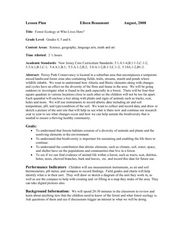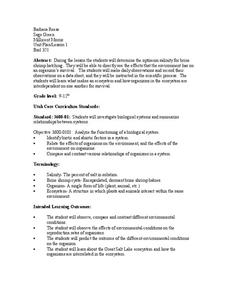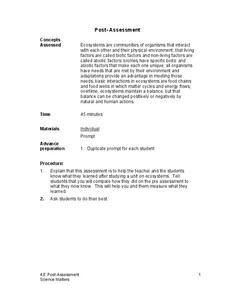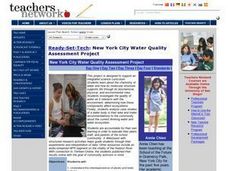Curated OER
Wetland Ecosystems: Non-living and Living Components and Brine Shrimp
Students explore wetland ecosystems. In this wetland lesson, students discuss and observe salt ponds and the organisms that live there. They explain how abiotic and biotic factors of species are important to survival.
Curated OER
Forest Ecology or Who Lives Here?
Learners explore a hardwood forest. In this forest ecology lesson, students examine the diversity and animals and plants as they explore their habitats at Poricy Park Conservatory. Learners determine how biodiversity and abiotic elements...
Curated OER
Land Associations
Students identify and explore life forms of various biomes, define transitional regions, examine effects of abiotic and biotic interactions, research a biome, and produce newspaper that features environmental information. Lessons all on...
Curated OER
Hatching Brine Shrimp
Third graders investigate the environment that is considered favorable for brine shrimp hatching. The salinity level is of particular interest in the observations because the optimum level is needed for survival. They make daily...
Curated OER
Land Use Unit
Students identify factors in human society and the natural environment aree interdependent. They analyze interdependencies demonstrated in various situations and occurances.
Curated OER
Critters in Your Own Backyard
Young scholars identify various animals and their habitats, as well as their specific traits In this animal habitat lesson, students list animals they've seen in their backyard. Young scholars select one animal and do research. Students...
Curated OER
Hands on Biome--Building
Students create a model biome. In this ecology lesson, students use materials to create a model biome. There is an extension activity that allows students to write about plants and animals and their specific biome.
Science Matters
Ecosystem Pre-Assessment
Test scholars' knowledge of ecosystems with a 20-question pre-assessment. Assessment challenges learners to answer multiple choice questions, read diagrams, and complete charts.
Science Matters
Post-Assessment
Twenty questions make up an assessment designed to test super scientists' knowledge of ecosystems. Scholars answer multiple-choice and short-answer questions about organisms, food chains, energy flow, and more.
National Wildlife Federation
Habitat Web
Young scientists weave together an understanding of ecosystems with this fun collaborative activity. Taking on the roles of different living and non-living elements of specific habitats, learners use a ball of yarn to create the web of...
Curated OER
Ecosystem Interactions in Refuges
Seventh graders, using national parks as models, illustrate the energy flow in ecosystems. Working in groups, they use murals, flow charts, or other visual displays to record their findings. Students represent the food chains and webs...
Curated OER
Forest In A Jar
Tenth graders are introduced to the process of succession and gain awareness of the changing nature of ecosystems. They demonstrate a comprehension of the dynamic nature of ecosystems, including the relationship between ecological...
Curated OER
Dibble Pond Ecosystem
Students collect specimen and analyze it. In this biology lesson, students analyze and evaluate the diversity found in specific environment. They use the correct terminology as they do their write up for the experiment.
Curated OER
Dirty Decomposers
Learners explore the ecosystem by conducting a ziploc bag experiment. In this recycling lesson, students identify decomposer organisms in our environment and how they speed up the recycling process. Learners utilize a ziploc plastic bag,...
Curated OER
What is Coral?
Students discuss what they know about coral reefs and are introduced to the importance of preserving coral reefs. In this coral reef lesson plan, students make connections between coral ecology in the classroom and in the real...
Curated OER
Our Schoolsyard is Full of Biology
Students study the habitats found in their schoolyard. They apply firsthand, what they have learned in the classroom to something familiar to them. Students look at biotic, abiotic habitats. Small groups will present their findings to...
Curated OER
Habitat survival
Sixth graders study different environments and how the food chain affects the survival of different animals. In this environments lesson plan, 6th graders share the visuals which describe the characteristics of the environment that they...
Curated OER
Norman Suburban Activity
Students analyze the factors affecting organisms in the pond ecosystem. In this environmental science lesson, students perform an experiment to determine pH, nutrients and temperature of different pond sites. They present their result to...
Curated OER
New York City Water Quality Assessment Project
Students investigate the chemistry of water and how its molecular structure supports life through its biochemcial, physical, and environmental roles. They investigate the quality of water as it interacts with the environment. Students...
Curated OER
Populations and Ecosystems
Sixth graders examine the factors that influence the stability of ecosystems. They construct a miniature ecosystem in a jar that includes plants, small fish, and snails, record the population changes over a period of four weeks, and...
Wild BC
Is Climate Change Good for Us?
Is it really that big of a deal if the global climate undergoes a little change? Young environmentalists consider this very question as they discuss in small groups the impact of different climate change scenarios on their lives, their...
Wild BC
Bearly Any Ice
After reviewing food chains, your class members participate in an arctic predator-prey game that exemplifies the impact of climate change of food availability. If you are in a hurry, skip this lesson, but if you have the time to...
Curated OER
Build an Ice Cap
Students research Earth science by conducting an experiment in class. In this ice-cap lesson, students identify what an ice cap is and create a biome using a box which measures 1 ft. x 1 ft. Students participate in an animal role-playing...
Curated OER
Build the Taiga: Hands on Biome-Building
Students explore environmental awareness by completing a construction project. In this biomes instructional activity, students identify the different elements for life to thrive in an ecosystem. Students utilize a cardboard or wood box...

























